Canned Baked Beans Have A Long History
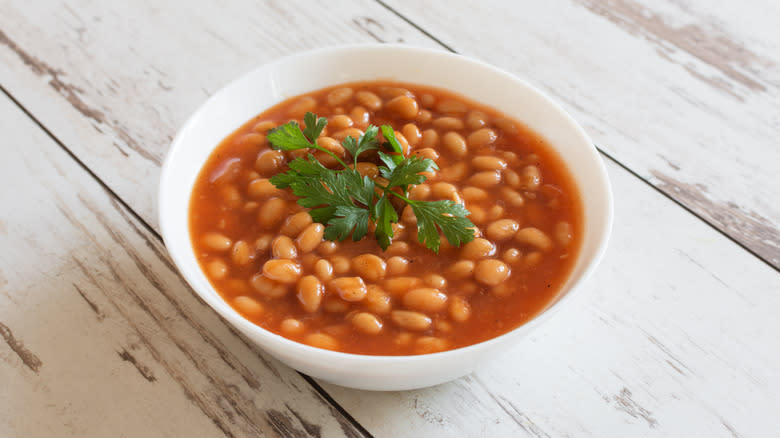
A pantry staple for quick and hearty meals, canned baked beans have been around for many years. Baked beans made from scratch have been prepared for even longer. It makes sense, then, that the history of the former product is long, complex, and surprising. Consider their flavor. Many of us know baked beans as a slightly sweet dish, but some canned options have been savory. Popular opinion also links this foodstuff with New England, especially in the form of Boston baked beans. But the United Kingdom has just as much of a claim on canned baked beans, if not more.
This is only the tip of the iceberg. Canned baked beans have served valiantly during moments of food scarcity throughout the 20th century. They have been made with a variety of different ingredients for reasons bound up in global politics. Through it all, they have remained a humble and accessible meal, beloved by rich and poor alike. This simple treat has quite a complex history, and we're here to explain it.
Read more: 12 Vegetables And Fruits That Used To Look Very Different
Baked Beans Have Murky Origins
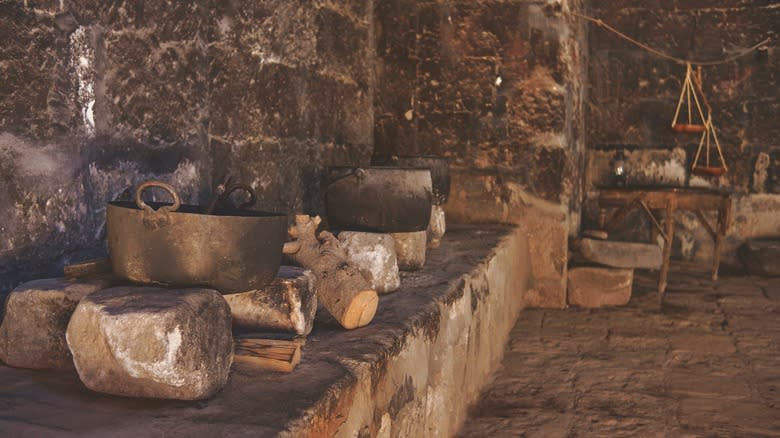
Baked beans' origins are difficult to trace, because beans have been enjoyed around the world for as long as the world has been cooking. It's possible they descend from imported British pottage recipes: Sandra Oliver, a Maine historian, has claimed baked beans could have come from English colonists in North America, who likely adapted their homeland's peas-and-meat dish by switching out peas for the indigenous beans of New England.
France's cassoulet might also claim heritage rights to baked beans, having possibly made its way to North America by way of French colonists. This makes a certain amount of sense; Julia Child once memorably described cassoulet on "The French Chef" as baked beans "with a French accent." This dish, a stew of beans and meat, was allegedly born during the Hundred Years' War as a southwestern French village's means of fortifying soldiers, according to certain legends. But this war story has little grounding in fact, as such a siege is never known to have actually taken place. The tale does, however, spark the beginning of a long line of myths regarding the dish.
Stories Suggest They Were A Colonial Staple
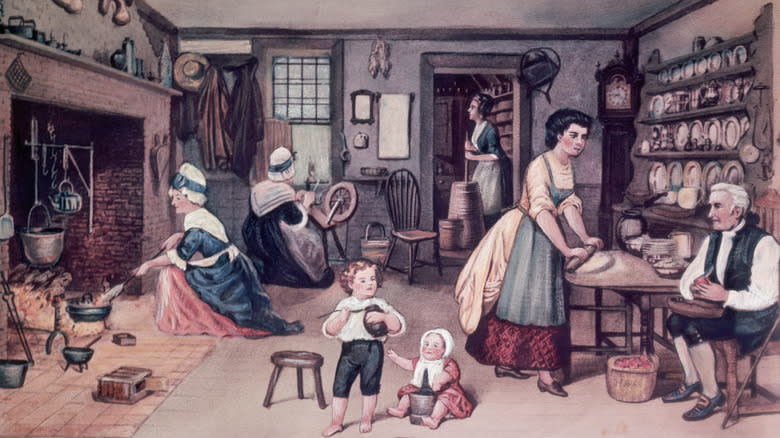
Baked beans' New England roots are linked to the region's Puritan heritage. Said Puritans, who settled in the Massachusetts Bay Colony, are said to have preferred baked beans as a weekend staple, because their preparation adhered to the Sabbath, which forbid cooking on Sunday: Beans could be cooked in bulk all day on Saturday, to be eaten throughout the weekend. However, recipes for baked beans are oddly scarce among the cooking manuals of this period. The Puritan preference for this dish is likely real, but it could be subject to some amount of lore and legend-making, especially when it comes to the details.
We do know, though, that baked beans were important to the early colonial period. Native American groups in the northeast, such as the Wampanoag, are known to have harvested and consumed beans. While some scholars write that these local bean recipes were sweetened with maple syrup, there is no evidence to suggest that this origin tale is more than myth. Whether Native American bean recipes influenced colonial cooking or not, it's more likely that both indigenous and colonial bean dishes were savory, as sweeteners were an uncommon luxury in North America at this point in history. In any case, baked beans have long since been consumed in the northeast, and are inextricably linked with the region, even if recipes have evolved considerably from their early origins.
Period Cookbooks Do Not Reflect The Origin Tales
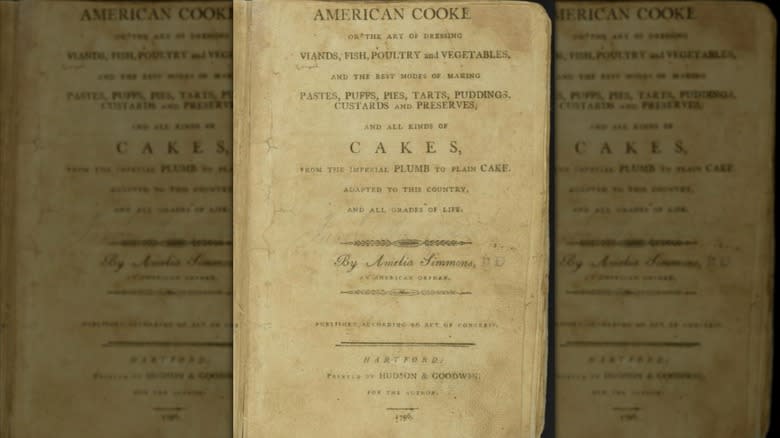
While stories suggest baked beans were a staple among both Native Americans and colonists in early New England, the cooking manuals of the time tell a different story. Before 1796, all cookbooks available in New England were British. Amelia Simmons' "American Cookery," published that year, is known as the first American cookbook, printed after the colonies had officially become the United States of America. Simmons' recipes aren't technically colonial, as a result, but they likely come from previous colonial culinary traditions. "American Cookery" does list beans as a vegetable worth preparing, but includes no recipe for baked beans.
In fact, the earliest recorded recipe for specifically-named baked beans doesn't show up until 1829, in Lydia Maria Child's "The American Frugal Housewife." "Baked beans are a very simple dish," the book opines, "yet few cook them well." This implies that baked beans must have been a reasonably well-known dish at that point in time. Perhaps so well known, in fact, that no one previously saw the need to record how to prepare them. For this humble dish, Child gives simple, assertive instructions. When the beans are ready, "put them into a bean pot with a piece of pork slashed across the rind, just covered with hot water, and let them bake three or four hours." Notably, there is no mention of a sweetener added to this recipe.
Boston Was Considered The Epicenter Of Baked Beans
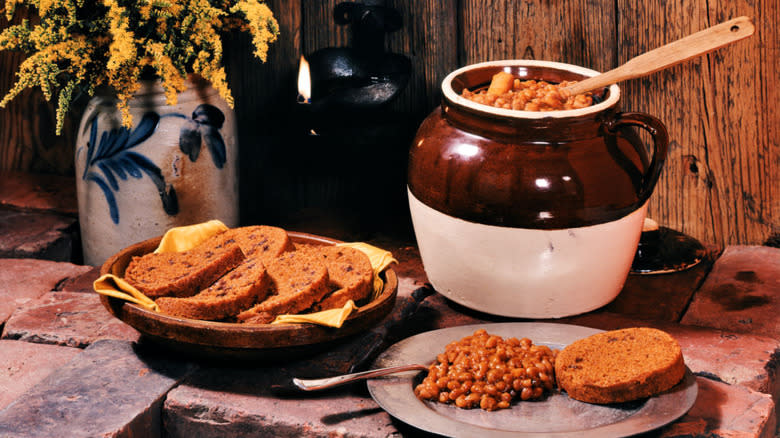
Most lore about the origins of baked beans suggests that Boston is responsible for the uniquely sweetened recipe we know and love today. Boston baked beans are named that way for a reason, after all. But while it's true that Boston had a huge molasses industry and early residents certainly ate plenty of beans, there isn't much evidence to suggest that anyone was eating the two things together until the late 1800s, after the Civil War.
Recipes calling for molasses in baked beans really took off in the late 19th century. But molasses had been important to Boston for decades before that. Though it isn't native to Boston, or the greater New England region, Boston was a major importer of molasses via the "triangle trade," which saw sugar plantations in the West Indies make huge profits off of molasses (among other things) shipped to New England to get distilled into rum. Founding father John Adams even wrote in an 1818 letter, "I know not why we should blush to confess that Molasses was an essential Ingredient in American Independence." This wasn't an innocent import, though -- the triangle trade was inextricably bound up with slavery.
Molasses went on to become deeply intertwined with the history of Boston. Baked beans are one reason why, but they're not the only one. Perhaps most infamously, there was the day in 1919 when molasses flooded the city. The Great Molasses Flood remains a major element of local lore.
Baked Beans Became A Western Delicacy
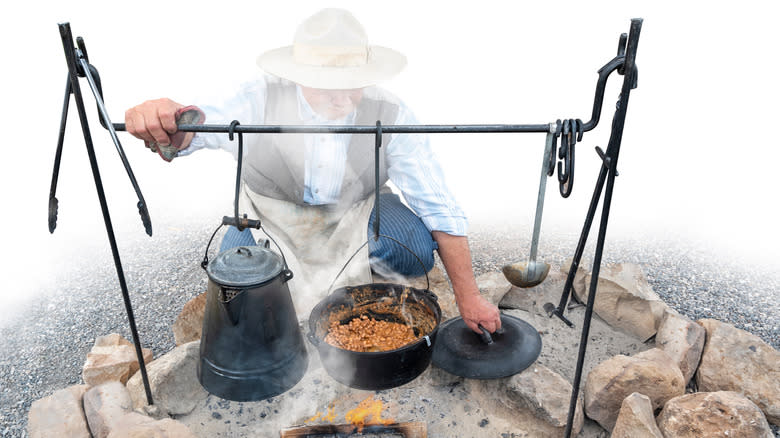
Granville Stuart, a formative figure of the Old West, recorded the details of his experiences as a gold prospector, pioneer, and rancher from 1852 through the end of the century in his autobiographical work, "Forty Years on the Frontier." He took special care to note what was served for meals on the move. On one particular cattle drive, "The food provided was corn meal, sorghum molasses, beans, salt, sugar, and coffee." Because dry beans were light and shelf stable, they were a popular choice for long-distance travelers in the 19th century. Molasses, also shelf stable, was another staple ingredient. It's highly possible, then, that pots of molasses-sweetened baked beans were among the meals crafty cooks of the era prepared.
Indeed, western author and blogger Natalie Bright showcased a testimonial from trail driver Henry Young, which describes a favorite meal: "[The cook] seasoned the whistle-berries with bacon and molasses. I am tell you, those beans were fitting to eat." Here, beans -- also known in cowboy speak as whistle-berries -- are part of a combination that undeniably resembles the Boston recipe we recognize today -- though it's not quite clear at what exact point in westward expansion this mélange was being served.
The Civil War May Have Inspired Canned Baked Beans
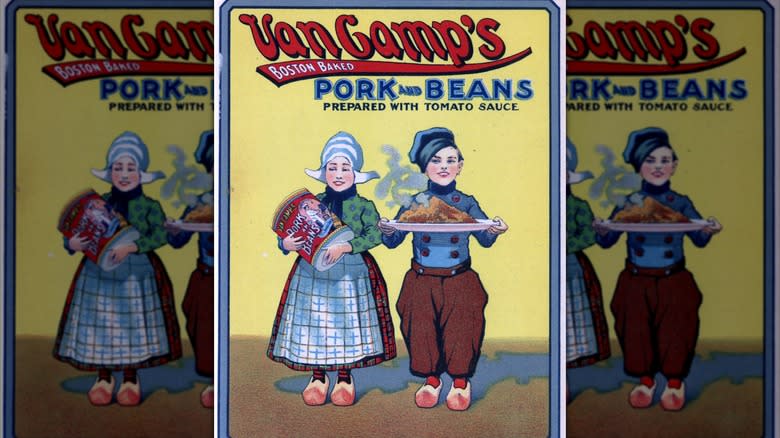
Canned foods were officially invented in 1809, in response to a challenge from Napoleon to improve the variety of preserved foods for French military and naval forces. Tales suggest that canned baked beans originated during the American Civil War with Gilbert and Hester Van Camp's canning business, which may have opened in Indianapolis as early as 1861. Some sources declare that Van Camp's well-timed innovation landed the company a contract with the Union Army to provide canned baked beans as part of soldiers' rations. But other sources can't trace Van Camp's origins to earlier than 1882, nearly 20 years after the conflict had come to a close.
Whenever Van Camp's canned baked beans did officially hit the market, they were different from the New England variety. A combination of baked beans, pork, and tomato sauce, Van Camp's baked beans were often advertised as "Boston Baked Pork and Beans Prepared with Tomato Sauce." While there isn't enough of a paper trail to entirely refute the possibility that Union soldiers may have been eating Van Camp baked beans from cans, it seems unlikely they would have opted for heavier canned goods when dry beans keep just as well and are more efficient to transport. Whether canned or not, it is at least documented that Civil War soldiers in the north were certainly consuming baked beans in some form when stationed at camp with the time to prepare them.
Sweetened Baked Beans May Come From A Colonial Revival
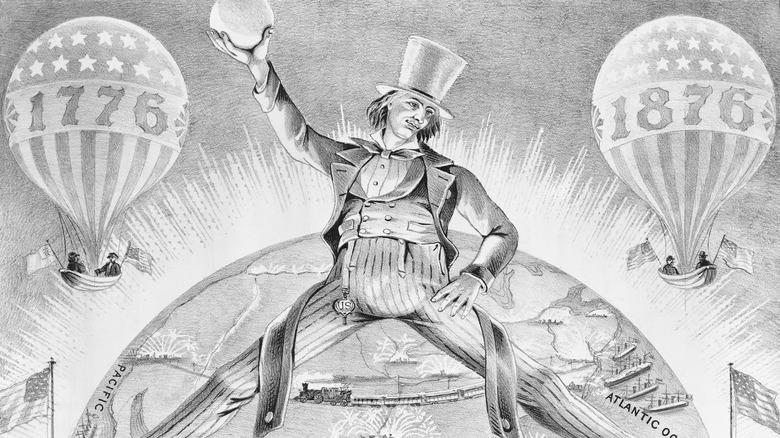
Evidence of baked beans being prepared and sweetened with molasses didn't start to appear until after the Civil War. Philadelphia's Centennial Exhibition of 1876 sparked a widespread cultural nostalgia for the values and patriotism that inspired the American Revolution, which stirred up a cultural movement now known as Colonial Revival. It expanded across all sectors of American life, eventually spurring a resurgence of "colonial" recipes that pop up in the well-known cookbooks of the era. Mary Goold's "New England Cook Book," Mary J. Lincoln's 1884 "Mrs. Lincoln's Boston Cook Book," and Fannie Merritt Farmer's 1896 "The Original Boston Cooking-School Cook Book" were three formative culinary texts of the time, and all contain a recipe for baked pork and beans, each emphasizing the previously unseen addition of molasses (albeit only a few tablespoons).
Author Meg Muckenhoupt argues in her book, "The Truth About Baked Beans," that the addition of molasses to this "traditional" New England recipe came from a spirit of regionalism harkening back to colonial lore. New England was intertwined with molasses, so New England-y dishes needed to incorporate it. Over time, more molasses was added as it became cheaper and more widely available. Ironically, despite representing a colonial revival, these sweet recipes don't really resemble the savory beans that colonial forebears prepared.
Heinz Popularized Canned Baked Beans
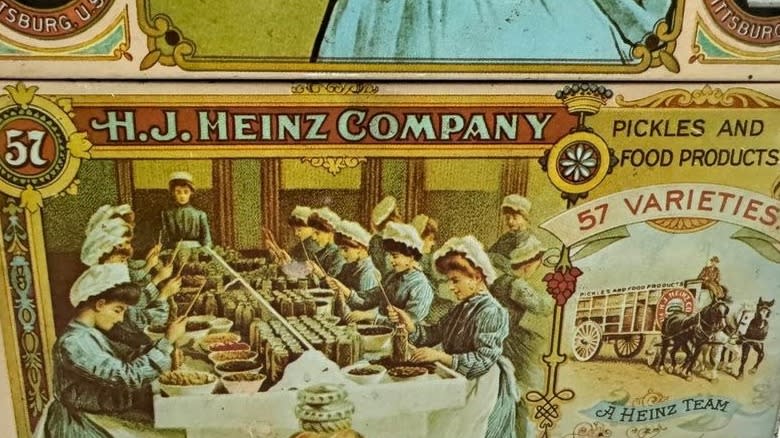
Though in operation since 1869, the Heinz company didn't jump into the baked bean scene until the 1890s, right when recipes for beans with molasses were catching on. Heinz introduced its canned baked beans to the American populace with a fair degree of success, but they became even more of a triumph when Heinz brought this phenomenon to the United Kingdom in the first years of the 20th century.
Originally marketed as an exciting luxury product, Heinz baked beans earned no small amount of attention for their canned nature. This was largely because canned foods of any kind were still somewhat lavish products at the time, and a serious novelty. But as canned foods became integrated into everyday life and Heinz worked on rebranding their baked beans as an everyman's meal, they caught on with more and more people. Nowadays, baked beans on toast are a staple of the culture. The food was so well-received by the British populace that Heinz opened factories in the UK.
They Later Became A British Staple
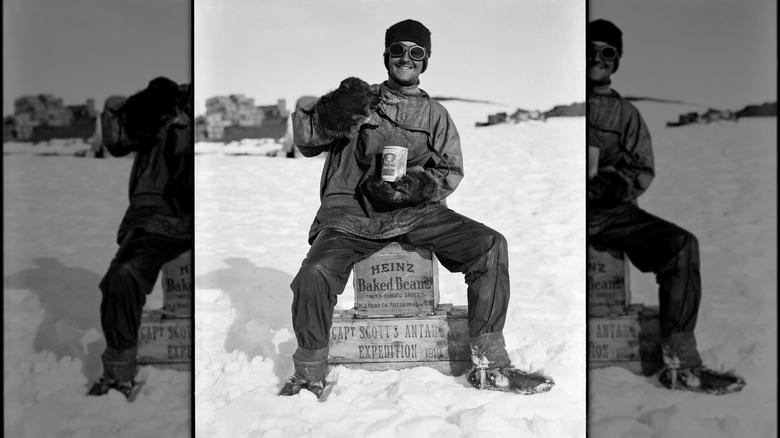
Heinz baked beans succeeded in winning over the United Kingdom in many different ways. In 1910, Heinz provided cans of baked beans for the ill-fated British Arctic Expedition, Terra Nova. Though the explorers didn't make it back from their search for the South Pole, photo evidence of canned baked beans amidst their rough arctic conditions may have helped associate the brand with rugged living, rather than luxury, in the public's opinion. Heinz's 1927 "Joy of Living" advertising campaign took things to further heights by making baked beans look downright fun. Continued targeted ads throughout the 20th century took further steps down the road of making beans into a British breakfast classic, whether as simple beans on toast or as part of the full English breakfast.
Part of Heinz baked beans' British success is also down to how the company adapted to local preferences. The beans' original slightly sweet flavor, à la New England, was less beloved by the British palate, so Heinz gradually adapted its recipe to adhere to the tastes across the pond. This entailed making baked beans less sweet and emphasizing tomato sauce (not difficult to add, when tomato products were what gave the company its start). This savory version of Heinz baked beans remains an important staple in British cuisine: According to Heinz (per The Guardian), the company's market share is nearly 70%.
Canned Baked Beans Were An Essential Wartime Food
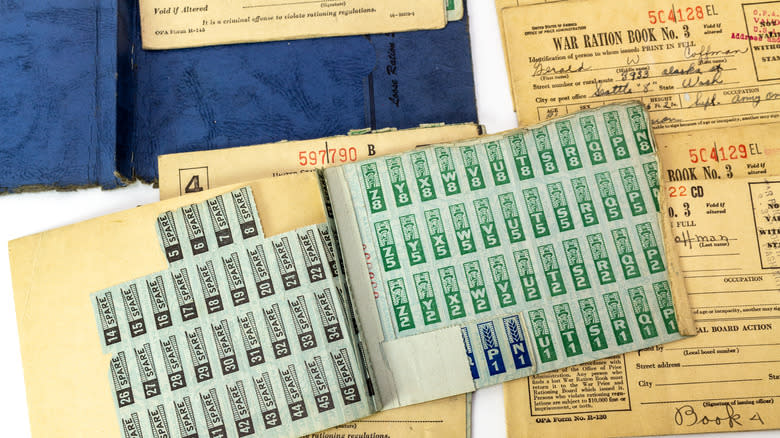
Heinz baked beans became even more important during World War II. Amidst Britain's strict war rationing, the Ministry of Food declared Heinz Baked Beans to be an "essential food." Cans of baked beans were one of the few things that never ran out (even when a Heinz factory was bombed). The baked beans recipe was, however, adapted to adhere to wartime rations, which meant that the originally included pork was removed. Though reduced to beans and tomato sauce, these cans were no less popular, and the combination proved to be an unexpected source of nutritional benefits. Not only are beans a good source of protein, but also of soluble fiber, which make eaters feel fuller (very practical in times of widespread food insecurity). The specific mixture of tomatoes and beans is particularly beneficial, as beans are also a good source of iron, which is made more easily absorbent by the vitamin C found in tomatoes.
Though less tomato-y, canned baked beans were also a wartime staple in the United States, and the traditional pork may have been removed from those cans too. But, as Robert Heide and John Gilman's book on wartime culture, "Home Front America," notes, canned baked beans remained important to American diets: "A meal of canned baked beans served with 'franks' or 'Spam'" was a standby.
Today's Canned Baked Beans Recipes Vary By Region
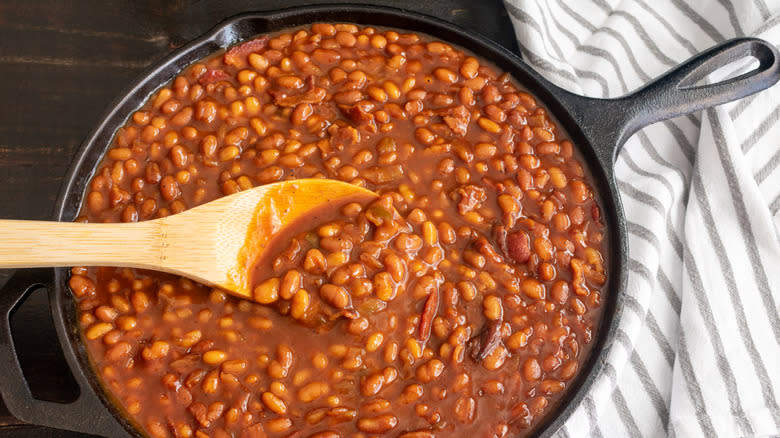
Today, the possibilities for canned baked beans extend much further than the well-known molasses and tomato varieties popularized in Britain and New England. Many recipes take inspiration from local flavors and traditions. Across the United States, for example, baked beans are served with many regional twists. Carolina BBQ-style baked beans go for a smokier flavor and follow the state's long-standing traditions. Tex Mex baked beans take the canned stuff to a deliciously Southwestern place with additions like green chile. Maine's bean suppers emphasize cooking methods which can be traced back to the days of logging camps, when workers kept beans cooking on embers buried in pits so that they'd be ready by the end of a long workday.
Canned baked beans are, in short, infinitely adaptable. Elevating baked beans is as easy as keeping them simple. And history's not through with them yet -- who knows what people will be doing with these humble cans 10, 20, or even 100 years from now? Despite hazy origins, one thing is clear: Canned baked beans have always been hearty, sustaining, versatile, and tasty.
Read the original article on The Daily Meal.


